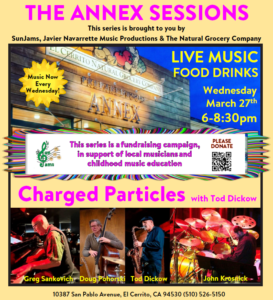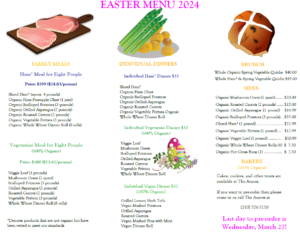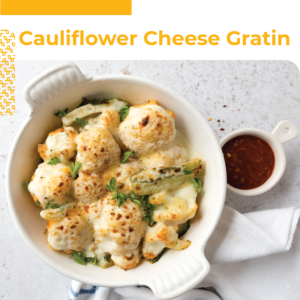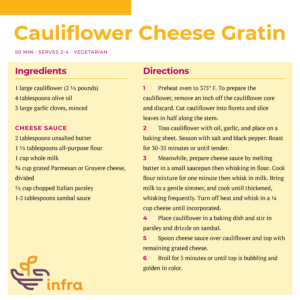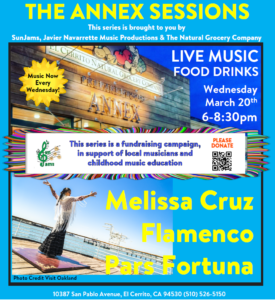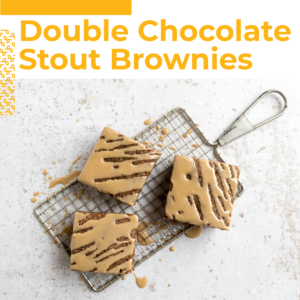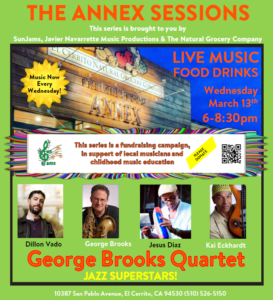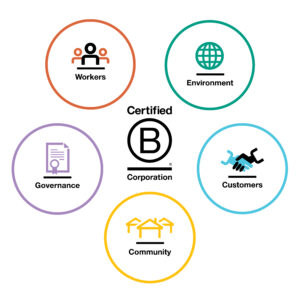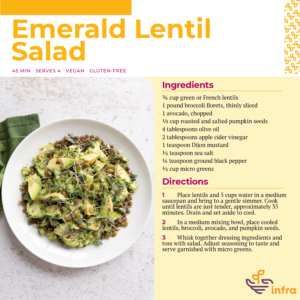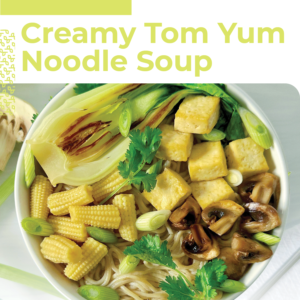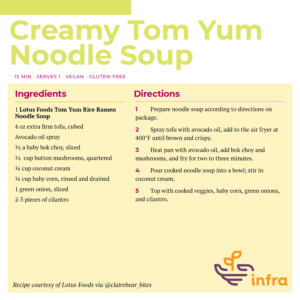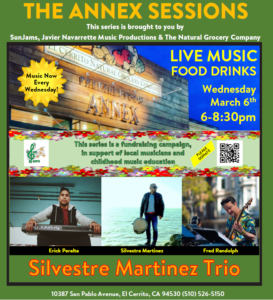Wednesday, March 27, 2024, 6-8:30pm will continue our music series held at El Cerrito Natural Grocery Company Prepared Food Annex (The Annex) – “The Annex Sessions”
Charged Particles with Tod Dickow
Tod Dickow – Tenor Saxophone
Greg Sankovich – Piano
Doug Pohorski – Bass
Jon Krosnick – Drums
Bay Area super-band Charged Particles plays a blend of funky Latin jazz. Downbeat Magazine said, “Charged Particles dazzle”, and Jazz Times Magazine said the band members are “tight and enormously talented.”
The jazz trio Charged Particles (www.chargedparticles.com) has played funky Latin jazz in Indonesia, the U.K., Canada, Germany, Switzerland, Sweden, and Italy, and across the U.S., at famed venues including Yoshi’s, Ronnie Scott’s, Birdland, Blues Alley, the Musical Instrument Museum, the Columbus Jazz Festival, the Stanford Jazz Festival, the San Luis Obispo Jazz Festival, the Eureka Springs Jazz Festival, and hundreds of others. The band recently sold out Ronnie Scott’s (in London) and Birdland (in New York City) with tenor saxophonist Tod Dickow and world class trumpeter, Randy Brecker, playing new arrangements of compositions by the late great jazz saxophonist Michael Brecker on the CD, “Live at the Baked Potato!” (Summit Records).
The CD was named among the best 2021 jazz releases in JazzTimes Magazine, Jazzwise Magazine, the San Jose Mercury News, the Jazz Journalists Association, the 16th Annual Jazz Critics Poll, Glide Magazine, Nippertown Magazine, and more publications.
In a concert review, Downbeat Magazine called the band “something special” and “inventive, invigorating, mesmerizing, beautiful, virtuosic, and lyrical.” Nippertown Magazine said the band’s performance at the Albany Riverfront Jazz Festival was “often thrilling” and “the peak set of the day”. The Oxford Times said their performance at the Spin Jazz Club was “brilliant”.
While studying music at the College of San Mateo, tenor saxophonist Tod Dickow began performing in the Bay Area with small groups and big bands, and he is a powerful voice on the Bay Area scene today. His playing has been recognized by outstanding soloist awards at the Pacific Coast Jazz Festival and was awarded the Outstanding Soloist award by Down Beat Magazine. He has appeared with numerous celebrated artists, including Ella Fitzgerald, Nancy Wilson, Joe Henderson, Bobby Hutcherson, Jackie & Roy, Harry Connick Jr, Steve Allen, Terry Gibbs, Frank Sinatra Jr., Dave Brubeck, and many more.
A East Bay native, Greg Sankovich began his keyboard journey with classical piano training and was inspired by jazz pianists include Herbie Hancock, Dr. Lonnie Smith, Keith Jarrett, and Bill Evans. After graduating from UC Berkeley, Greg moved to Tokyo to perform with his jazz fusion group, Taikun, where he lived for over 10 years, performing and recording with a long list of top Japanese artists and music production companies. He is currently a keyboardist, producer, and music educator in the Bay Area while leading his band, Times 4.
Doug Pohorski is a Bay Area bassist, recording engineer, producer, and composer. He has been performing on the upright and electric bass for over 35 years with a host of instrumentalists and vocalists, including at jazz festivals such as the Monterey Jazz Festival, the San Jose Jazz Festival, and the Montreux Jazz Festival. Doug has shared the stage with many talented musicians including; Bobby McFerrin, John Stowell, Bruce Forman, Mark Levine, Michele Hendricks, Gary Meek, Calvin Keys, and Denise Perrier. Doug also owns and operates his own recording studio: Acoustic Sound Shop Studios.
Drummer Jon Krosnick has been in the Bay Area for 20 years, performing with Charged Particles as well as the nine-piece Latin jazz group, The Lunar Octet. Jon began his jazz drumming by studying with celebrated jazz superstar Peter Erskine. He worked with a range of bands playing jazz and other genres, including the Jon Krosnick Quintet, State of Mind, the New Jazz Sextet, Pangaea, the Kristen Strom Quartet, the Dewayne Oakley Trio, and many more. Recently, he performed with two trios, including (1) Chick Corea and John Patitucci, and (2) Bill O’Connell and Lincoln Goines.
https://www.facebook.com/charged.particles/
https://www.instagram.com/chargedpart/?hl=en
https://twitter.com/chargedpart?lang=en
The Natural Grocery Company is proud to present this series in partnership with SunJams and Javier Navarrette Music Productions.
SunJams is committed to funding children’s music education in underserved public elementary schools. Your donation will help support this ongoing program.
All of the proceeds will go directly to our network of local musicians, each of whom have been severely impacted by the lack of events during the COVID-19 pandemic.
Whether you donate $10, $100, or $1000 – any amount helps and will allow us to keep bringing music to our community! As always, your donation to SunJams 501(c)3 may qualify as tax exempt.
Javier Navarrette Music Productions continues to bring live music to several venues around the Bay Area. Javier has been a professional musician and music educator in the Oakland Unified School District for the past 20 years. Over the past few years Navarrette has produced outdoors events that have proven instrumental in enabling musicians to deal with some of the fallout of the pandemic and shutdown that followed.
COVID RELATED SAFETY MEASURES
Please be safe. Feel free to wear a mask if you prefer.
TICKETS
Tickets are NOT required for this venue, you can simply come in, order food and beverages at the Annex counter and pay at the registers.


